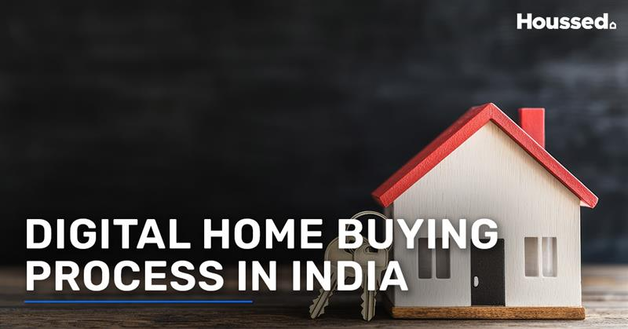Digital Home Buying Process in India in 2025

As India’s real estate evolves, technology is reshaping every stage of the home-buying process, from property discovery to legal checks, virtual tours, financing, documentation, and registration.
With maximum buyers embracing digital tools in 2025, platforms now offer AI-powered recommendations, real-time market insights, and immersive 3D walkthroughs, providing buyers with clarity and confidence.
Read on to explore the digital home buying process in India, allowing you to secure your journey towards owning a home.
Why is Digital Home Buying Gaining Popularity?
1: Increased Internet Penetration & Mobile Usage
India's internet user base is expected to surpass 900 million in 2025, with over 886 million users accessing the internet on smartphones. This widespread connectivity enables people in all corners of the country to search for homes online with ease. Tier‑2 towns and even villages now enjoy high-speed data, making it easier to browse, track, and transact digitally.
2: Convenience & Time-Saving
Digital home buying saves buyers from travelling to multiple sites, waiting in queues, and handling paperwork. Online platforms offer everything from virtual tours to signing and digital payments, making the home purchasing process fast and frictionless.
Also Read - What Is Home Loan
Step-by-Step Digital Home Buying Process in India
Step 1: Online Property Research
For the digital home buying process in India, the first step is to conduct comprehensive research. Explore the real estate portal houssed, which allows users to search and find properties based on location, price, size, amenities, and builder reputation.
This digital exploration stage empowers buyers to make informed decisions without relying solely on brokers.
Step 2: Checking Legal and RERA Details
To ensure legal security, verify legal and RERA details by visiting the state RERA portal. These websites provide project status, approved layouts, builder records, and pending litigations.
This self-verification step helps avoid fraud and ensures that you invest only in legally approved properties.
Step 3: Virtual Site Visits and Consultations
After identifying potential properties, take a virtual tour through websites and apps that offer high-resolution 360° views, live 3D walkthroughs, drone footage, and video consultations.
This helps you to examine the design, natural light, neighbourhood and finishes from their screens, which is especially useful for NRIs or those living far from the site.
These virtual tools replicate the feel of physical visits while saving time and effort.
Step 4: Loan Eligibility & Digital Home Loan Application
To ensure a smooth home-buying experience, it’s essential to verify your loan eligibility. Banks and NBFCs offer digital home loan portals that assess eligibility in seconds using PAN, Aadhaar, income, and credit score.
Applicants can upload salary slips and bank statements through OCR (Optical Character Recognition) enabled platforms. AI evaluates documents for pre-approval.
Platforms like the RBI’s Unified Lending Interface are even faster in processing by integrating land records and GST data.
Step 5: Booking the Property Online
When you shortlist a property, you lock it in digitally. Pay a small token via UPI, net banking, or wallets to reserve the property. Many builders now propose pocket-friendly token options, such as 1% down or split plans, like 10:90 or 20:80.
Some even offer interest subsidies until possession. This digital-first payment process ensures your spot in the property buying process. It boosts buyer confidence, making the journey feel less like a gamble and more like a safe bet.
Step 6: Digital Documentation and Agreement Signing
In the digital home buying process in India, the sale agreements, allotment letters, and builder-buyer contracts can be signed digitally using Aadhaar OTP and e-stamp systems.
The process is legally valid and saves time by eliminating the need for physical presence. The government is working toward a fully online registration system through the proposed Online Property Registration Bill.
Step 7: Final Payment & Registration
After the balance payment and agreement signing, buyers complete registration. E-stamp services and cloud-based registry portals (e.g., Dharani) digitise stamp duty and registration.
Buyers can download title deeds and encumbrance certificates online, ensuring transparency, compliance, and closure without needing to visit government registries.
Also Read - Home Loan Process
Top 5 Digital Platforms to Buy Homes in India
1: 99acres.com
Launched in 2005, 99acres is one of the leading digital platforms to buy a house in India, offering quick, efficient, and cost-effective information about real estate properties across the country.
At 99acres, users can advertise properties, search for properties, and create their property microsites. The platform boasts approximately nine lakh property listings in over 600+ Indian cities.
It assists prospective buyers by providing virtual tour features, verified photos, price trends, and project reviews, ensuring an informed buying decision.
It received numerous awards, including:
- Most Admired Real Estate Website of the Year
- BCI Awards in 2012
- Best Real Estate Portal in 2012
- Best Online Realty Portal by Accommodation Times Awards in 2012
2: MagicBricks.com
Established in 2006, Magicbricks is a leading platform that offers property location services and provides sourcing information.
It utilises Natural Language Processors (NLPs) to enhance conversations by analysing key metrics, including speech rate, call sentiment, and conversation balance.
The platform was honoured with the Real Estate Excellence (REE) Award for Best Property Portal in both 2011 and 2012.
In 2024, Magicbricks launched PropWorth, a tool that provides instant property valuations for over 50,000 projects, simplifying the process of selling and buying homes.
With over 17 years of experience, Magicbricks boasts more than two crore monthly visitors and 15 lakh active property listings.
3: Houssed.com
Houssed is a tech platform for residential search in India, providing comprehensive information to help homebuyers easily find their dream house.
Houssed specialises in new residential project listings from verified developers in Tier 1 and Tier 2 cities. It offers deep insights into RERA-approved projects, pricing, and builder history.
Users can filter by possession date, budget, and location, with detailed comparisons available. It is India's first direct-to-buyer real estate platform, making it one of the top real estate websites for buying houses in India in 2025.
4: Housing.com
Founded in 2012, Housing.com is India's number one real estate platform, offering a diverse range of properties, including new homes, commercial spaces, resale homes, rentals, plots, and co-living accommodations.
Additionally, it provides personalised property search, market insights, virtual tours, AR/VR experiences, home loan assistance, end-to-end transaction support, and post-sale services for both buyers and renters.
With a presence in 28 cities, including tier 1 and 2 cities, Housing.com simplifies the home buying, selling, and renting journey for its customers.
5: NoBroker.in
NoBroker, a Bangalore-based brokerage-free prop-tech company, was founded in 2013 by Amit Kumar Agarwal, Akhil Gupta, and Saurabh Garg.
It offers a marketplace for real estate services, including buying, renting, packing, and moving. It eliminates broker commissions by connecting buyers and owners directly, especially in metro cities.
It verifies listings via AI and field executives, enhancing trust. The platform also offers legal services, rental agreements, and home loans.
The platform has expanded its service across India, including Bangalore, Chennai, Delhi, Hyderabad, Mumbai, and Pune.
Also Read - Online Platforms to Buy House in India
Digital Tools That Aid the Home Buying Process
1: Property Portals
Property portals enable buyers to search, filter, compare, shortlist, and communicate with sellers or agents, all within a single digital hub. Platforms like Houssed, Zillow, Redfin, and Realtor.com provide photos, floor plans, neighbourhood data, and market-trend heat maps.
You can track real-time price changes and trend predictions, often integrated with legal checks, advisor chat support, and direct loan referrals.
Buyers may also receive AI-powered suggestions and instant notifications for properties that match their criteria, ensuring they never miss their dream home.
2: Mortgage Calculators
Mortgage calculators help buyers forecast their monthly Equated Monthly Instalments (EMIs), total interest paid, and affordability based on different loan tenures and interest rates.
More advanced options, even on bank apps, include AI‑driven tools that suggest ideal down payments and loan amounts.
Some calculators take it a step further by factoring in insurance, taxes, and closing costs to provide a more comprehensive cost picture. These tools support informed decisions and budget planning, preventing surprises later.
While using the digital home buying process in India, mortgage calculators help you understand if your dream home aligns with what you can realistically afford.
3: Document Upload & Verification Platforms
Digital document platforms simplify KYC and loan approval processes. Using OCR technology, these tools allow seamless upload of income proofs, bank statements, ID documents, and more.
RBI’s Unified Lending Interface (ULI) integrates records databases and KYC sources for nearly frictionless verification.
These platforms reduce physical paperwork, minimise errors, and expedite the underwriting process. It helps facilitate faster pre-approval, reduces back-and-forth, and provides a more responsive process, especially when timing is critical in competitive markets.
Benefits of the Digital Home Buying Process in India
- Convenience: Buyers can explore and transact remotely, making it ideal for NRIs, working professionals, or those in distant locations. They can view 5–10 times more options in a shorter amount of time.
- Transparency: Digital records, RERA updates, property histories, and blockchain integration curb fraud. Smart contracts on blockchain also flag risks of tampering.
- Cost Efficiency: Digital solutions save on travel, agent commissions, and paperwork costs. Developers today provide flexible payment plans for buyers with liquidity constraints.
- Time-Saving Process: Digital verification, online legal reviews, and automated approvals cut down waiting time significantly—sometimes by weeks.
- Access to Verified Listings: Major portals and RERA-backed platforms now show verified listings only, reducing risk and helping buyers make faster decisions.
- Virtual Reality (VR) Tours: With 360° walkthroughs and VR integration, buyers can "visit" homes without being physically present—ideal for busy professionals or NRIs.
- Easy Documentation & E-Signatures: Digital KYC, Aadhaar-based e-signing, and cloud-based documentation mean no courier hassles or physical document runs.
- Better Financial Planning Tools: Online home loan calculators, EMI simulations, and instant pre-approvals allow buyers to assess budgets before shortlisting.
- Greater Developer Accountability: Online reviews, social proof, and digital feedback mechanisms make it easier to evaluate a builder’s credibility.
Also Read - Buying Vs Renting
Digital Home Buying Process in India: Do’s & Don’ts
The table highlights some key dos and don’ts in the digital home buying process in India.
|
Do’s |
Don’ts |
|
Verify RERA and title documents online |
Don’t skip legal vetting, even in digital processes |
|
Inspect virtual walkthroughs thoroughly |
Don’t rely solely on portal listings, always cross-check builder history |
|
Compare EMI, interest rates, and tenure digitally |
Don’t ignore tiny charges hidden in booking or documentation fees |
|
Save digital copies and audit trails of every transaction |
Don’t finalise payment before securing loan pre‑approval |
Summary
Why Is Digital Home Buying Gaining Popularity?
- Increased internet penetration and mobile usage
- Convenience and time-saving
Step-by-Step Digital Home Buying Process in India
- Step 1: Online property research
- Step 2: Checking legal and RERA details
- Step 3: Virtual site visits and consultations
- Step 4: Loan eligibility & digital home loan application
- Step 5: Booking the property online
- Step 6: Digital documentation and agreement signing
- Step 7: Final payment & registration
Top 5 Digital Platforms to Buy Homes in India
- 99acres.com
- MagicBricks.com
- Houssed.com
- Housing.com
- NoBroker.in
Digital Tools That Aid the Home Buying Process
- Property portals
- Mortgage calculators
- Document upload & verification platforms
Benefits of the Digital Home Buying Process in India
- Convenience
- Transparency
- Cost Efficiency
- Time-Saving Process
- Access to Verified Listings
- Virtual Reality (VR) Tours
- Easy Documentation & E-Signatures
- Better Financial Planning Tools
- Greater Developer Accountability
Do’s in Digital Home Buying Process in India
- Verify RERA details
- Review virtual tours carefully,
- Compare financial options and save all transaction records
Don’ts in Digital Home Buying Process in India
- Avoid skipping legal checks
- Ignoring hidden charges
- Making payments without loan pre-approval
FAQ's
Yes, digital transactions leverage RERA, e-signature, and blockchain, which together enhance transparency and security, making online home buying safe in 2025.
Digital home buying processes are gaining popularity in India, but their availability varies across regions and property types, with the majority being found in major metropolitan areas.
Yes, it is possible to purchase a flat in India without physically visiting the site, especially for Non-Resident Indians (NRI). You can research the property, tour virtually, and register online using the portals' tools and legal backing.
Houssed.com, 99acres, and MagicBricks are among the top websites for buying a home in India, allowing users to search properties based on location, price, size, amenities, and builder reputation.
Yes, from research to registration, digital methods cut timelines from months to weeks or days, especially in loan approval and documentation.
Virtual property tours in India utilise 360° video, real-time walkthroughs, drone views, and VR/AR staging to allow buyers to explore properties online.
Common documents required for online home purchase are:
- Identity Proofs like Aadhaar, PAN card
- Bank statements
- Salary slips
- Property ID
- Builder approvals
- RERA registration
- NOCs, OC/CC
- E-sign when closing
Yes, E-signing is legal in Indian property transactions, with Aadhaar-based e-signatures and e-stamps accepted for sale agreements and other documents. Proposed bills aim to include property registration.
Digital home buying involves secure online payments through credit/debit cards, net banking, digital wallets, and mobile payment apps like Apple Pay and Google Pay.
Yes, NRIs can purchase property in India through digital processes, including virtual tours, online platforms for property searches, and online transactions. However, some formalities may still require a physical presence or a Power of Attorney (POA).









